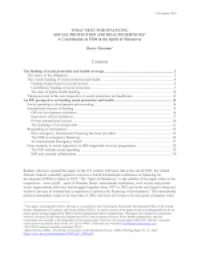
A Contribution to FfD4 in the Spirit of Monterrey
Barry Herman, November 2024
This paper was prepared as part of a project for the United Nations, which is assisting its Member States, international institutions, civil society and private sector stakeholders who are preparing the fourth International Conference on Financing for Development (FfD), which is to take place in Seville, Spain, 30 June - 3 July 2025.
The paper addresses practical and political challenges in designing and adopting adequate financing of social protection and healthcare with domestic revenues and international support in "normal" times and in crisis times. Past FfD conferences have forged agreements on new and reformed international cooperation policies. Additional information may be found here on Conference preparations.
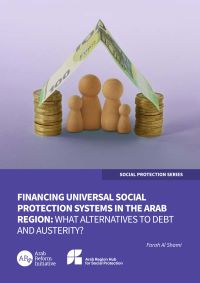
Arab Reform Initiative, Arab Region Hub for Social Protection, October 2024
This paper offers a detailed analysis of the social protection financing landscape, identifying challenges and proposing reforms. Suggested solutions include self-financed contributory schemes, fiscal and public finance reforms, debt relief and restructuring, climate finance instruments, and global funding mechanisms. The paper’s added value lies in politicizing a typically technical discussion and drawing comparative insights from five national contexts: Egypt, Lebanon, Jordan, Tunisia, and Morocco.
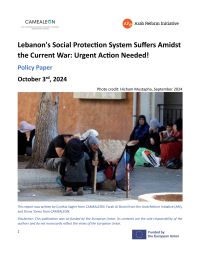
Arab Reform Initiative, CAMEALEON, October 2024
This policy paper provides recommendations for policymakers to further develop this response and later improve the shock-responsiveness and -resilience of the country’s social protection system.
The war in Lebanon has exacerbated the existing economic crisis, leading to mass displacement and increased poverty. The emergency response has been inadequate and limited to cash transfers and in-kind donations reaching only a small portion of those in need.
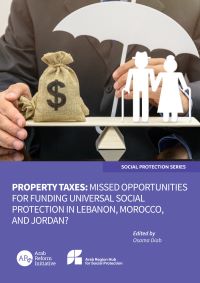
Arab Reform Initiative, Arab Region Hub for Social Protection, October 2024
The West Asia-North Africa (WANA) region has poor tax collection rates. At first glance, one might attribute this to oil-producing countries known for low tax rates. However, even when excluding these countries, the tax rate in oil-importing countries remains around 18%, which is below both the global average and the averages of comparable countries and regions.
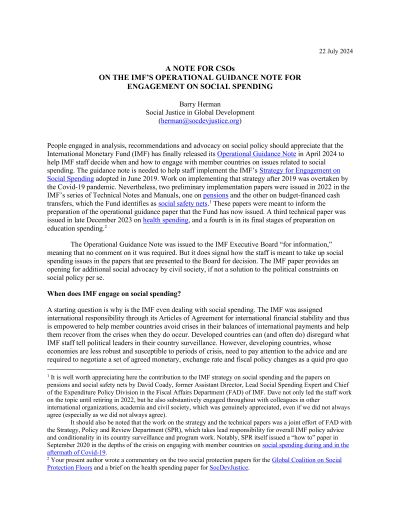
By Barry Herman, Social Justice in Global Development
In April 2024 the IMF released its Operational Guidance to help IMF staff decide when and how to engage with member countries on issues related to social spending. The Operational Guidance Note was issued to the IMF Executive Board “for information,” meaning that no comment on it was required. But it does signal how the staff is meant to take up social spending issues in the papers that are presented to the Board for decision. The IMF paper provides an opening for additional social advocacy by civil society, if not a solution to the political constraints on social policy per se.
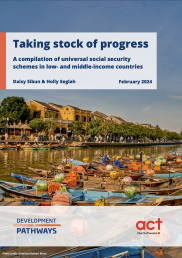
A compilation of universal social security schemes in low- and middle-income countries.
By Daisy Sibun & Holly Seglah. February 2024
In this paper, the authors compile information about existing social security programmes for children, elderly, and persons with disability. We find that universal programmes are not only feasible in theory, but that they do exist. We have identified 88 such social programmes in 52 low- and middle-income countries that are universal or benefit-tested. This compilation does not prove that low- and middle-income countries can afford universal programmes but shows that it should not be assumed that they cannot do so.
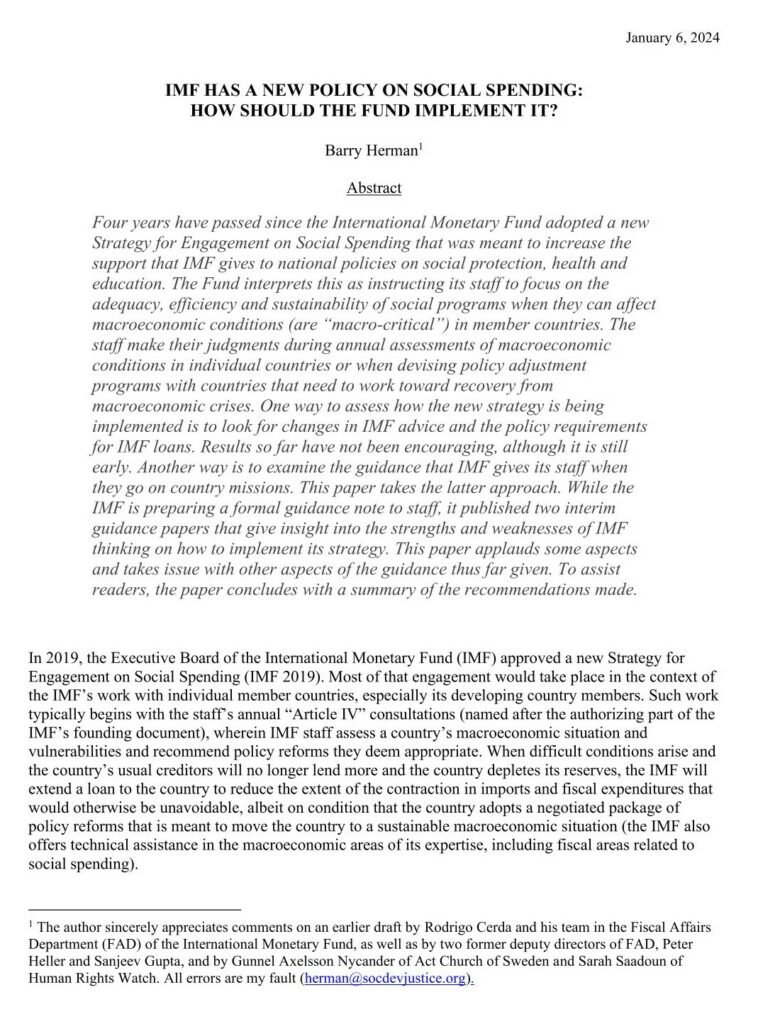
By Barry Herman, Social Justice in Global Development
Four years have passed since the IMF adopted a new Strategy for Engagement on Social Spending that was meant to increase the support that IMF gives to national policies on social protection, health and education. The Fund interprets this as instructing its staff to focus on the adequacy, efficiency and sustainability of social programs when they can affect macroeconomic conditions in member countries.
Results so far have not been encouraging, although it is still early. The IMF has published two interim guidance papers that give insight into the strengths and weaknesses of IMF thinking on how to implement its strategy.

Guide on which vocabulary and arguments to use while advocating for universal social security

With examples from Uganda, Ghana, India and Vietnam, it shows how universal child benefits, pensions and benefits for persons with disability is affordable, if introduced gradually.

A critical analysis of how the World Bank’s tries to reconcile its overall support of “universal social protection” with its continued promotion of poverty targeted programs

Evidence of extremely high exclusion and inclusion errors in poverty targeted social assistance programs

By promoting austerity, shrinking fiscal spaces, imposing the "cascade approach", and shaping development paradigms, IFIs undermine social protection and exacerbate gender inequalities.

Research and Policy Design Challenges.
This paper by the Arab Reform Initiative looks into financing mechanisms for more inclusive, effective, and sustainable social protection systems in the Arab region. It focuses on the role of the IMF in shrinking fiscal spaces, thus limiting public and especially social spending. It demonstrates how the Fund is promoting austerity, imposing conditionalities that hinder alternatives, driving countries into a debt trap, and enforcing detrimental credit risk management. The paper proposes alternatives to this prevalent model, ranging from key fiscal reforms and solidarity financing instruments to utilizing climate finance as an opportunity for funding universal social security.

This paper by the Arab Reform Initiative discusses how conditionaliality might be turned into an opportunity in countries with nefarious political economy and corrupt political regimes, covering the case of Egypt amid current IMF negotiations.

The paper shows how so-called “social registries” – targeting databases – exacerbate targeting errors, are extremely costly and violate the integrity of people.

This paper, by Stephen Kidd, Gunnel Axelsson Nycander, Anh Tran and Madeleine Cretne published on November 2020, consideres another aspect of the debate on targeting and universality: the role that social protection can play in strengthening or weakening social contracts, which depends on the design of the programmes. Throughout the paper, the authors underscore that the design question is not purely a technical issue for social protection experts to solve or discuss. Rather, it should consider both recipients’ and non-recipients’ reactions to different forms of targeting, which are closely linked to issues around surrounding trust, fairness and political choices.

From 1981 to 2014, thirty countries privatized fully or partially their public mandatory pensions; as of 2018, eighteen countries have reversed the privatization.

This is a short synthesis of the book with the same name, documenting the failures of pension privatization and how countries reversed to a public social security system

This book is a compendium of 50 country good practices in building universal social security systems including floors.

This paper presents cost of universal social protection floors in the poorest countries and discusses financing and affordability

This ILO database offers the latest official data to monitor progress towards universal social protection (SDG 1.3)

This handbook shows that financing universal social security is feasible even in the poorest countries.

Legal depository of international human rights instruments and standards on social security

This paper sets out a post-Covid needs and affordability of a universal basic income in South Africa

An initial analysis of how universal basic income could be part of the just transition agenda in South Africa.

A study showing that stepping up public investments can have significant positive impacts on employment and overall economic growth.
Available in EN ES FR

The report found that financing social protection through progressive forms of taxation – such as progressive income tax, corporate tax, and capital tax – generates positive social and economic outcomes, debunking the myth that such forms of taxation are a drag on employment and growth.
Available in EN ES FR

This study shows that there is a strong economic, as well as moral and public health, case for governments to introduce universal social protection.

Because decisions to introduce flat-rate taxes, reform social contributions and/or privatise pensions are not backed by strong evidence of a positive impact on economic growth, and given that these policies disproportionately favour the wealthy within a society, this paper argues that they are largely political and ideological decisions.

The International Monetary Fund has said that it protects spending on education, health and social protection from cuts in its loan programmes through social spending floors.
Analysis of all 17 IMF loan programmes for low- and middle-income countries during the first two years of the pandemic shows that these floors are deeply inadequate, inconsistent, opaque and failing.

Development finance institutions owned by European governments and the World Bank Group are spending hundreds of millions of dollars on expensive for-profit hospitals in the Global South that block patients from getting care, or bankrupt them, with some even imprisoning patients who cannot afford their bills.
Oxfam is calling on rich European governments and the World Bank Group to immediately halt their spending on for-profit private healthcare


Decades of social policy focused on tiny levels of means-tested support have left most countries completely unprepared for the COVID-19 economic crisis. Yet, countries such as South Africa and Bolivia have shown that a universal approach to social protection is affordable, and that it has a profound impact on reducing inequality and protecting those who need it most.

The findings in this briefing paper show that the IMF is systematically encouraging countries to adopt austerity measures once the pandemic subsides, risking a severe spike in already increased inequality levels. A variety of studies have revealed the uneven distribution of the burden of austerity, which is more likely to be shouldered by women, low-income households and vulnerable groups, while the wealth of the richest people increases.

We need to transform our economies to deliver universal health, education and other public services. To make this possible, the richest people and corporations should pay their fair share of tax. This will drive a dramatic reduction in the gap between rich and poor and between women and men.

In this Q&A doc, Development Pathways and HRW explain the human rights obligations and responsibilities of governments and entities that influence social spending, and the importance of universal social security to meeting them. They also explain the basics of universal social security, how it can reduce and prevent poverty and inequality and protect human rights, including in times of crisis, and how governments can overcome impediments to providing it.